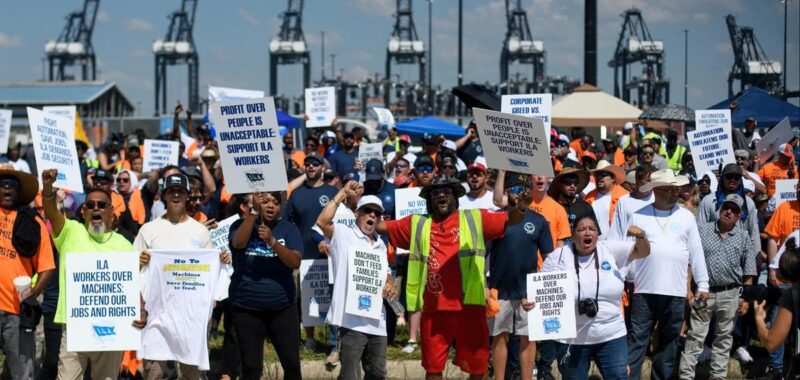The International Longshoremen’s Association, the union representing striking U.S. dockworkers at East and Gulf coast ports, reached a tentative deal Thursday to suspend its strike until Jan. 15 to negotiate a new contract.
The strike had shut down 14 ports along the East and Gulf Coasts since Tuesday.
The deal was reached with the United States Maritime Alliance (USMX), a shipping industry group representing terminal operators and ocean carriers.
The two sides have “reached a tentative agreement on wages and have agreed to extend the Master Contract until January 15, 2025 to return to the bargaining table to negotiate all other outstanding issues,” the ILA and USMX said in joint statement Thursday evening announcing the agreement.
The statement added that “all current job actions will cease and all work covered by the Master Contract will resume.”
In an interview with CBS News Baltimore immediately after the deal was announced, ILA Local 333 President Scott Cowan said the deal involved a 61.5% wage increase over the next six years and includes language to protect workers from automation “and other issues that we need resolved.”
Before launching the strike, the ILA had pushed for a 77% wage hike, the equivalent of a $5 per hour increase for each year of the contract. USMX last week offered a nearly 50% increase, along with improvements to employee benefits, but it was not enough to avert the first strike by East and Gulf Coast dockworkers in nearly half a century.
How much do dockworkers make?
Under the dockworkers’ last labor contract with USMX, which lapsed on September 30, starting pay for longshoreman was $20 per hour and topped out at $39, or just over $81,000 a year. Some dockworkers can earn more than $100,000 by working overtime.
The union was also seeking a complete ban on cargo terminals using automated cranes, gates and container-moving trucks to load and unload freight. It was not immediately clear if the tentative deal addressed the issue of automation.
Experts had warned that a prolonged strike could block the import and export of a number of products, including food, factory parts, and raw materials like wood and copper. Economists also worried that a long work stoppage could potentially drive up inflation and even lead to shortages of certain products.
This is a developing story. Check back for updates.

